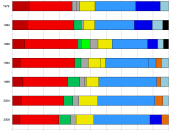The international order in Europe has gone through dramatic change during the last sixty years. It took two appalling wars at the beginning of last century for the continent's leaders to realise the dangers of nationalism and the traditional balance-of-power politics, with which it is often associated. Their response to the devastation of total war was to lay the premises for European cooperation, which today is institutionalised as the European Union. The extraordinarily long period of peace that the continent has enjoyed after the Second World War is enough to prove that the project for European unity has been a remarkable success. In the 21st century, cooperation takes place at a scope and depth unparalleled by any other regional union in the world.
Throughout its existence, the EU has also been the subject of intense intellectual debate. The main rivals in this debate are the ones that stress the supranational character and the autonomous power institutions have in the European Union and the ones who claim that it is only a regional state-system where national governments play the decisive role.
The former is commonly referred to as the federalist school of thought while the latter go by the name of the intergovernmentalists. These main camps have throughout the years developed various subdivisions with slightly different theories. However for our purposes the very broad definition mentioned above is used when referred to the federalists or intergovernmentalists. The essay will start by outlining the intergovernmentalist argument, then move on to discuss the response of the federalists to show that the European Union is much more than one of world's many regional state systems.
The intergovernmentalist approach to the European Union is often closely aligned with realism in more general International Relations theory. It focuses on the role of the state, and the...


